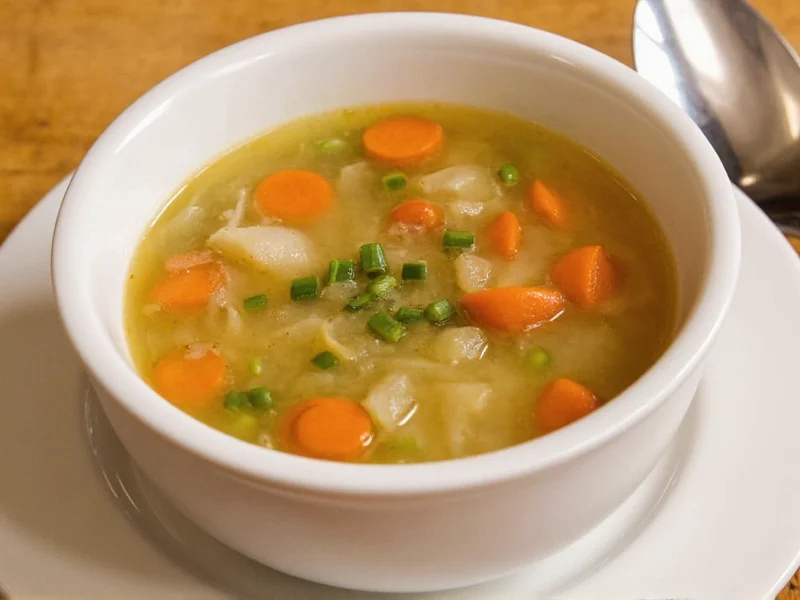Understanding the calorie content of French onion soup is essential for anyone tracking their nutritional intake or making informed dining choices. This classic comfort food's calorie count varies significantly based on preparation methods and ingredients used.
What Determines French Onion Soup Calories?
The calorie count in French onion soup depends primarily on four key components: the broth base, caramelized onions, cheese topping, and bread garnish. Traditional recipes start with a rich beef broth simmered with大量 onions that have been slowly caramelized in butter—this process alone adds substantial calories from the fat content.
When examining french onion soup nutrition facts, consider that a single tablespoon of butter contains approximately 100 calories, and recipes typically use 2-4 tablespoons for caramelizing onions. The signature melted cheese topping (usually Gruyère) contributes another 75-150 calories depending on portion size, while the toasted bread slice adds 70-100 calories to the final count.
Calorie Comparison: Restaurant vs. Homemade
When ordering french onion soup at restaurants, you'll encounter significant variations in calorie content. Upscale establishments often serve more generous portions with richer ingredients, while casual dining spots may offer lighter versions.
| Preparation Type | Serving Size | Calorie Range | Primary Calorie Contributors |
|---|---|---|---|
| Traditional Restaurant | 1.5-2 cups | 300-400 | Butter, Gruyère cheese, baguette slice |
| Light Restaurant Version | 1.5 cups | 220-280 | Reduced-fat cheese, less bread |
| Standard Homemade | 1.5 cups | 250-350 | Butter amount, cheese selection |
| Low-Calorie Homemade | 1.5 cups | 180-240 | Substituted ingredients |
Nutritional Breakdown Beyond Calories
When evaluating french onion soup nutrition facts, calories tell only part of the story. A typical serving also contains:
- Fat: 12-20g (primarily from butter and cheese)
- Carbohydrates: 20-30g (mostly from onions and bread)
- Protein: 8-12g (from broth and cheese)
- Sodium: 800-1500mg (varies significantly by recipe)
For those monitoring sodium intake, traditional french onion soup can be particularly high in salt, especially restaurant versions where broth is often concentrated for flavor.
Creating Lower-Calorie French Onion Soup
You can significantly reduce calories in french onion soup while maintaining flavor through strategic ingredient substitutions. Understanding how many calories in french onion soup come from specific components allows for targeted modifications:
- Reduce butter: Use 1 tablespoon instead of 3-4, substituting with olive oil spray for caramelizing onions
- Cheese alternatives: Choose stronger-flavored cheeses like aged Gouda that require less quantity for the same flavor impact
- Bread modifications: Use a thinner slice of whole-grain bread or eliminate entirely for french onion soup without bread calories
- Broth selection: Opt for low-sodium, homemade broth to control ingredients
- Onion technique: Allow onions to caramelize slowly with minimal fat for natural sweetness
A well-executed low calorie french onion soup recipe can deliver satisfying flavor at approximately 200 calories per serving—about 30% fewer calories than traditional preparations.
Serving Size Awareness
One of the most overlooked factors in french onion soup calories is portion size. Restaurant servings frequently exceed standard 1.5-cup portions, sometimes reaching 2-3 cups. When dining out, ask about serving sizes before ordering to make accurate calorie estimations.
At home, using a measuring cup to portion your soup ensures you're consuming the calorie amount you intended. Many people underestimate french onion soup nutrition facts simply because they're consuming larger portions than recipe estimates suggest.
Healthy Indulgence Strategy
French onion soup can fit into a balanced diet when approached strategically. Consider these tips for enjoying this classic dish without derailing your nutritional goals:
- Order as an appetizer rather than a main course to control portion size
- Ask for the bread to be served on the side to moderate consumption
- Pair with a substantial green salad to increase satiety
- Choose restaurants that specify lighter preparation methods
- Prepare homemade versions with intentional ingredient modifications
Remember that occasional indulgence in traditional french onion soup calories won't impact long-term health goals when balanced with overall dietary patterns. The key is awareness and moderation rather than complete avoidance.
Frequently Asked Questions
How many calories are in French onion soup without bread?
A bread-free version of French onion soup typically contains 180-250 calories per 1.5-cup serving. Removing the toasted bread slice eliminates approximately 70-100 calories from the total count, making this a simple modification for those tracking their calorie intake.
Is French onion soup high in calories compared to other soups?
Traditional French onion soup is moderately high in calories compared to broth-based soups but lower than cream-based varieties. A standard serving (250-350 calories) contains more calories than vegetable soup (100-150 calories) but fewer than cream of mushroom soup (350-450 calories). The cheese and bread toppings significantly increase the calorie count compared to simpler soups.
Can I make French onion soup lower in calories without sacrificing flavor?
Yes, you can create a flavorful low-calorie French onion soup by using techniques like slow caramelization with minimal oil, selecting strongly flavored cheeses that require smaller portions, and using whole-grain bread sparingly. Adding umami-rich ingredients like tomato paste or mushrooms can enhance depth of flavor without adding significant calories, resulting in a satisfying dish at approximately 200 calories per serving.
How do restaurant French onion soup calories compare to homemade versions?
Restaurant French onion soup typically contains more calories than homemade versions, averaging 300-400 calories per serving compared to 250-350 for standard homemade recipes. Restaurants often use more butter for caramelizing onions, generous cheese portions, and larger bread slices. Some establishments offer "light" versions that may contain 220-280 calories, but these are less common than traditional preparations.
What's the biggest contributor to calories in French onion soup?
The primary calorie contributors in traditional French onion soup are the butter used for caramelizing onions (accounting for 20-30% of total calories), followed by the cheese topping (25-35%) and the bread slice (20-25%). The broth and onions themselves contribute relatively few calories, making these three components the main targets for calorie reduction when creating a lower-calorie version.











 浙公网安备
33010002000092号
浙公网安备
33010002000092号 浙B2-20120091-4
浙B2-20120091-4